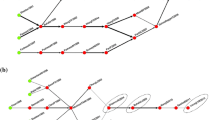Abstract
Objective
This paper aimed to examine the reliability of co-citation clustering analysis in representing the research history of subject by comparing the results from co-citation clustering analysis with a review written by authorities.
Methods
Firstly, the treatment of traumatic spinal cord injury was chosen as an investigated subject to be retrieved the resource articles and their references were downloaded from Science Citation Index CD-ROM between 1992 and 2002. Then, the highly cited papers were arranged chronologically and clustered with the method of co-citation clustering. After mapping the time line visualization, the history and structure of treatment of spinal cord injury were presented clearly. At last, the results and the review were compared according the time period, and then the recall and the precision were calculated.
Results
The recall was 37.5%, and the precision was 54.5%. The research history of traumatic spinal cord injury treatment analyzed by co-citation clustering was nearly consistent with authoritative review, although some clusters had shorter period than which was summarized by professionals.
Conclusion
This paper concluded that co-citation clustering analysis was a useful method in representing the research history of subject, especially for the information researchers, who do not have enough professional knowledge. Its demerit of low recall could be offset by combination this method with other analytic techniques.
Similar content being viewed by others
References
Small, H., Griffith B. C., The structure of scientific literature: Identifying and graphing specialties. Science Studies, 4 (1974) 17–40.
Cui, L., A co citation cluster analysis to highly cited in special documentation. Information Studies: Theory & Application, 1 (1996) 46–48.
Morris, S. A., Yen, G., Wu, Z., Asnake, B., Time line visualization of research fronts. Journal of American Society for Information Sciences, 54 (2003) 413–422.
Ochiai, A., Zoogeographic studies on the soleoid fishes found in Japan and its neighbouring regions. Bull. Jap. Soc. Sci. Fish, 22 (1957) 526–530.
Zhang, W. T., SPSS Statistical Analysis Senior Textbook. Higher Education Press, 2004, p. 242.
Bracken, M. B., Shepard, M. J., Collins, W. F., Holford, T. R., Young, W., Baskin, D. S., Eisenberg, H. M., Flamm, E., Leo-Summers, L., Maroon, J. &al., A randomized, controlled trial of methylprednisolone or naloxone in the treatment of acute spinal-cord injury. Results of the second national acute spinal cord injury study. New England Journal of Medicine, 322(20) (1990) 1405–1411.
Li, H. X., Yu G., Rong, Y. H., Mathematic recognition model of aging process for scientific and technological literature. Journal of Library Science in China, 26(127) (2000) 81–84.
Author information
Authors and Affiliations
Corresponding author
Rights and permissions
About this article
Cite this article
Zhao, Y., Cui, L. & Yang, H. Evaluating reliability of co-citation clustering analysis in representing the research history of subject. Scientometrics 80, 91–102 (2009). https://doi.org/10.1007/s11192-008-2056-1
Received:
Published:
Issue Date:
DOI: https://doi.org/10.1007/s11192-008-2056-1





